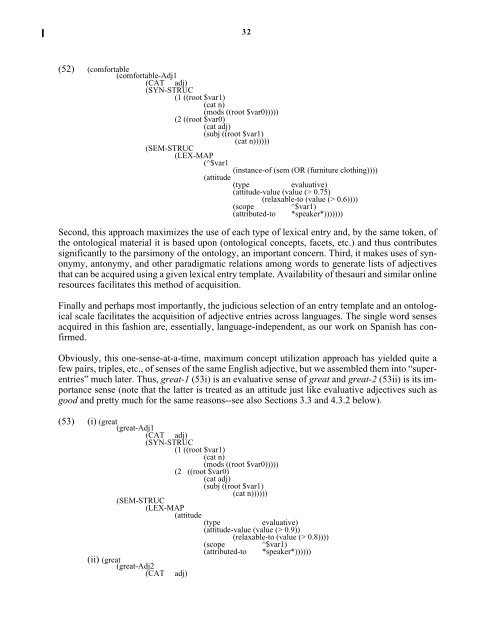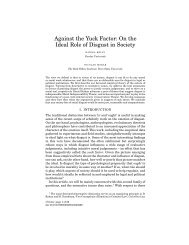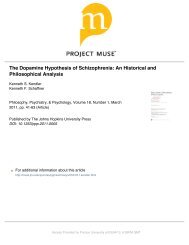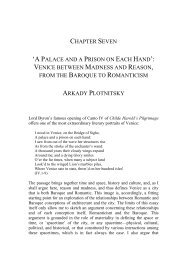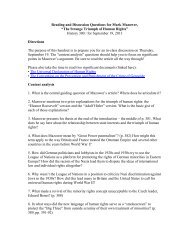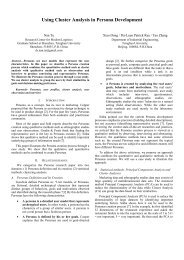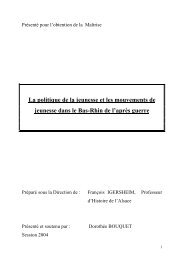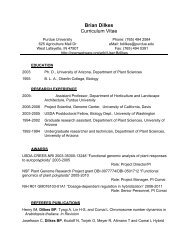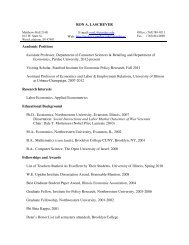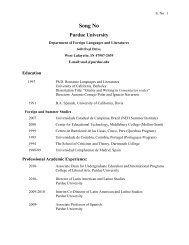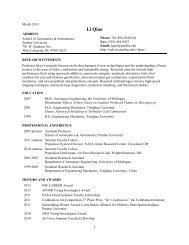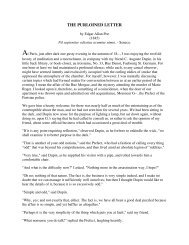Lexical Semantics of Adjectives - CiteSeerX
Lexical Semantics of Adjectives - CiteSeerX
Lexical Semantics of Adjectives - CiteSeerX
Create successful ePaper yourself
Turn your PDF publications into a flip-book with our unique Google optimized e-Paper software.
(52) (comfortable<br />
(comfortable-Adj1<br />
(CAT adj)<br />
(SYN-STRUC<br />
(1 ((root $var1)<br />
(cat n)<br />
(mods ((root $var0)))))<br />
(2 ((root $var0)<br />
(cat adj)<br />
(subj ((root $var1)<br />
(cat n))))))<br />
(SEM-STRUC<br />
(LEX-MAP<br />
(^$var1 (instance-<strong>of</strong> (sem (OR (furniture clothing))))<br />
(attitude (type evaluative)<br />
(attitude-value (value (> 0.75)<br />
(relaxable-to (value (> 0.6))))<br />
(scope ^$var1)<br />
(attributed-to *speaker*)))))))<br />
32<br />
Second, this approach maximizes the use <strong>of</strong> each type <strong>of</strong> lexical entry and, by the same token, <strong>of</strong><br />
the ontological material it is based upon (ontological concepts, facets, etc.) and thus contributes<br />
significantly to the parsimony <strong>of</strong> the ontology, an important concern. Third, it makes uses <strong>of</strong> synonymy,<br />
antonymy, and other paradigmatic relations among words to generate lists <strong>of</strong> adjectives<br />
that can be acquired using a given lexical entry template. Availability <strong>of</strong> thesauri and similar online<br />
resources facilitates this method <strong>of</strong> acquisition.<br />
Finally and perhaps most importantly, the judicious selection <strong>of</strong> an entry template and an ontological<br />
scale facilitates the acquisition <strong>of</strong> adjective entries across languages. The single word senses<br />
acquired in this fashion are, essentially, language-independent, as our work on Spanish has confirmed.<br />
Obviously, this one-sense-at-a-time, maximum concept utilization approach has yielded quite a<br />
few pairs, triples, etc., <strong>of</strong> senses <strong>of</strong> the same English adjective, but we assembled them into “superentries”<br />
much later. Thus, great-1 (53i) is an evaluative sense <strong>of</strong> great and great-2 (53ii) is its importance<br />
sense (note that the latter is treated as an attitude just like evaluative adjectives such as<br />
good and pretty much for the same reasons--see also Sections 3.3 and 4.3.2 below).<br />
(53) (i) (great (great-Adj1<br />
(CAT adj)<br />
(SYN-STRUC<br />
(1 ((root $var1)<br />
(cat n)<br />
(mods ((root $var0)))))<br />
(2 ((root $var0)<br />
(cat adj)<br />
(subj ((root $var1)<br />
(cat n))))))<br />
(SEM-STRUC<br />
(LEX-MAP<br />
(attitude (type evaluative)<br />
(attitude-value (value (> 0.9))<br />
(relaxable-to (value (> 0.8))))<br />
(scope ^$var1)<br />
(attributed-to *speaker*))))))<br />
(ii) (great<br />
(great-Adj2<br />
(CAT adj)


